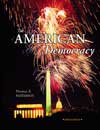 American Democracy, 5/e Jennifer Sudol
The American Heritage: Seeking A More Perfect Union
Chapter GlossaryBelow is the glossary for this chapter.
| The recognized right of an official or institution to exercise power. (See also power). |
 |  |  | | An economic system based on the idea that government should interfere with economic transactions as little as possible. Free enterprise and self-reliance are the collective and individual principles that underpin capitalism. |
 |  |  | | The idea that there are definable limits on the rightful power of a government over its citizens. |
 |  |  | | A form of government in which the people govern, either directly or through elected representatives. |
 |  |  | | The principle that individual differences should be respected, are a legitimate basis of self-interest, and are a source of strength for the American nation. |
 |  |  | | The view that the United States is essentially run by a tiny elite (comprised of wealthy or well-connected individuals) who control public policy through both direct and indirect means. |
 |  |  | | The principle that all individuals have moral worth and are entitled to fair treatment under the law. |
 |  |  | | The institutions, processes, and rules that are designed to facilitate a declared authority;#8217;s control of a particular area and its inhabitants. |
 |  |  | | A philosophical belief that stresses the value of hard work and self-reliance, and holds that the individual should be left to succeed or to fail on his or her own. |
 |  |  | | The principle that the people should be free to act and think as they choose, provided they do not infringe unreasonably on the rights of others. |
 |  |  | | The idea that the majority prevails not only in elections, but also in determining policy. |
 |  |  | | A theory of American politics that holds that society;#8217;s interests are substantially represented through the activities of various groups, and driven by the interests of these distinct (plural) groups. |
 |  |  | | Generally, any broad course of governmental action; more narrowly, a specific government program or initiative. |
 |  |  | | The deep-seated and characteristic beliefs of a particular people, which often informs decisions on policy and government operation. |
 |  |  | | The various, separate components of American Government that connect with one another and influence each others;#8217; performance. |
 |  |  | | The process through which society makes its governing decisions. |
 |  |  | | The ability of persons, institutions or groups to control policy. (See also authority). |
 |  |  | | The principle that the people are the ultimate source and proper beneficiary of governing authority; in practice, a government based on majority rule. |
 |  |  | | The principle that Americans are one People, who form an indivisible union. |
|




 2001 A McGraw-Hill Online Learning Centre
2001 A McGraw-Hill Online Learning Centre